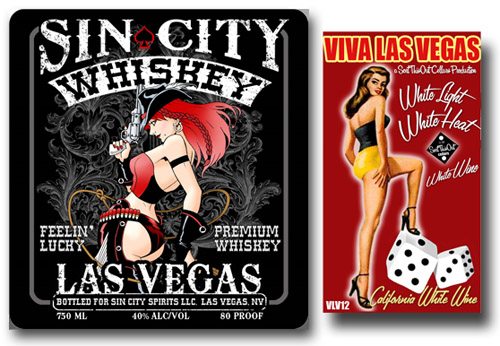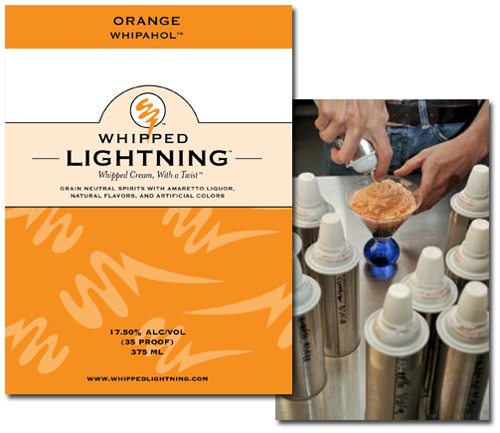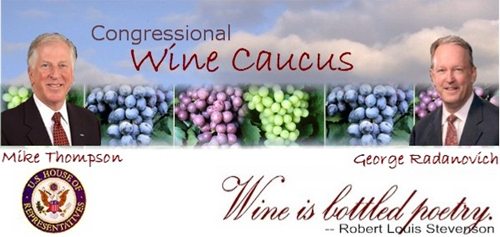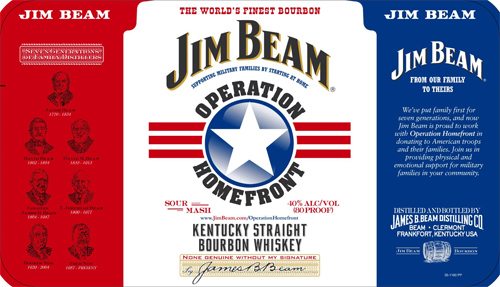
For Girls Chicks Women Only.
Yes; it is difficult to imagine a male sipping this, with a straight face. Chick Food watermelon schnapps (above) is also available as pomegranate schnapps. The products are made by Side Pocket Foods of Cottage Grove, Oregon.
Sin City Libations
Sin City seems to be alive and well in the hearts and minds of drinkers and marketers everywhere. Sin City Whiskey (above) is imported by Side Pocket Foods of Oregon. Viva Las Vegas is a California white wine bottled by Cartlidge & Browne Winery of American Canyon, California.
Whipahol
Good idea. A 38 proof spirit in a ReddiWhip can. Somebody should have done it a long time ago. The Atlanta Journal-Constitution reports that:
two Atlanta inventors are getting ready to release a product they think will forever change the world of silly cocktails as we know it. … So original and so potentially game-changing is this creamy newcomer that the inventors had to invent a word for it. … It is a beautiful word, a portmanteau of the highest order, and it tells you all you need to know: Whipahol!
Because of a state law that prevents bars from selling liquor from containers smaller than 750 ml, the Whipped Lightning boys have yet to get a Georgia distributor. So they’re beginning with distribution deals in neighboring states and are working toward getting a Georgia waiver.
Maple Grove Products … is the only producer of distilled spirits in the state of Georgia, according to David Dyal at the Georgia Department of Revenue.
This is what happens you combine alcohol, cream, a lawyer, and Devo (“It’s not too late. To whip it. Whip it good.”).
November 30, 2010 Update: here is a good CNBC clip on Whipahol, from yesterday. It is hard to believe that this light and frothy product can be portrayed as something sinister, and whipped up into the next “controversy in a can.”
December 8, 2010 Update: the whipped booze products get so very much attention (including our extensive on-air interview with CBS radio) that TTB issues a statement, to explain how such products are regulated.
Reps. Thompson and Radanovich Comment; Top 5 Things to Know
It is likely that all beer, wine and spirits labels will change dramatically in the near future. TTB has been working on new rules since CSPI and other groups submitted a petition in 2003. The new rules would require a “Serving Facts” panel on every container. This panel would include a lot more information, such as the typical serving size, number of servings per container, calories, carbohydrates, protein and fat. Because this is a big, controversial change, TTB has received more than 18,000 public comments during the past few years. There are far too many comments for most people to review, and so we will highlight and summarize the most noteworthy comments here. The most recent proposal and comments are here. This is comment 17 in a series; to see others, click on the “serving facts” tag below.
Representatives Mike Thompson (D-CA 1st) and George Radanovich (R-Mariposa) are co-chairmen of the Congressional Wine Caucus. Their 2-page comment said:
- This rule “could lead to the most significant revisions in wine label requirements in the history of the American wine industry.”
- It could “have a severely detrimental impact on the wine industry.”
- There is little evidence that consumers want or need additional information of this type, and TTB should balance this against the burden.
- TTB should make it voluntary, or allow the use of typical values rather than analytical values.
- The burdens are unreasonable. They could “easily reach into the hundreds of thousands of dollars for a medium sized winery.”
New York Apples
Maybe N. Bergman or L. Fogelman can explain why there are so many distilled spirits plants in New York, all of a sudden. Here are three, and all are distilling vodka from apples (rather than the much more common and less expensive distillation from grain).
Tuthilltown Spirits makes Heart of the Hudson Vodka (above). It is distilled from 100% New York apples. Eighty miles up the Hudson River, Harvest Spirits makes Core Vodka. They purport to distill only from Hudson Valley apples, in small batches.
Third, there is Beak & Skiff Vodka, also distilled from apples, over near Syracuse. Larrie Laird (the dean of distilling apples in the US) once explained that it is immensely expensive to produce high-proof spirits from apples or any other fruit. It can take well over 25 pounds of apples to make one bottle.
Military Spirits
More than six years in, many labels reflect the US at war. Above is Jim Beam “Operation Homefront” Bourbon. The idea is to “provid[e] physical and emotional support for military families in your community.” The label doesn’t really say how, but the website does.
Brave Spirits was early to link spirits with supporting the military. TTB approved their Valor Vodka back in 2007. Brave donates $2 per bottle toward the military. Valenzano Sangria is the only one that outright shows the American flag; TTB does not usually allow it, but this one is restricted for sale in New Jersey only. Valenzano donates $1 per bottle to “Operation Troop Aid.”
The Intoxicologist recently said this form of marketing is tacky. What do you think?






